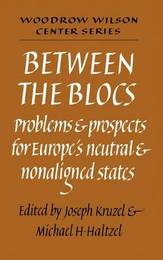
|
Between the Blocs: Problems and Prospects for Europe's Neutral and Nonaligned States
Hardback
Main Details
| Title |
Between the Blocs: Problems and Prospects for Europe's Neutral and Nonaligned States
|
| Authors and Contributors |
Edited by Joseph Kruzel
|
|
Edited by Michael H. Haltzel
|
| Series | Woodrow Wilson Center Press |
|---|
| Physical Properties |
| Format:Hardback | | Pages:344 | | Dimensions(mm): Height 229,Width 152 |
|
| ISBN/Barcode |
9780521375580
|
| Classifications | Dewey:320.94 |
|---|
| Audience | | Professional & Vocational | |
|---|
|
Publishing Details |
| Publisher |
Cambridge University Press
|
| Imprint |
Cambridge University Press
|
| Publication Date |
26 January 1990 |
| Publication Country |
United Kingdom
|
Description
Today's major European neutrals - Austria, Finland, Ireland, Sweden and Switzerland - are heirs to a venerable and adaptable tradition. In the turmiol of the past two centuries, many neutral states have diasppeared, othes have joined alliance systems, and those that have remained or become neutral have often seen themselves as misunderstood, even as their international positions have solidified. Neurality is no longer an easily defined, static legal concept, but an evolving political practice. In Between the Blocs many of the preeminent scholars and political figures who have crafted the shape and meaning of the modern policy of neutrality in their own problems of neutrality and nonalignment in comporary Europe. The credibility of the military defenses of the European neutrals in the late twentieth century is perhaps the most heatedly debated question addressed in the book. Of particular significance are the political and military challenges to Sweden by foreign submarine incursions, which were a major topic of domestic Swedish debate in the 1980s. A number of challenging economic issues confronting the neutral states are also examined. The technological gap between the neutrals and the two military blocs is large and widening, and the restructuring of the global economy is pushing the neutrals into closer cooperation with the European Community. Maintaining a national policy is costly and requires widespread public support, yet open discussion of sensitive issue may jeopardize the neutral status a government is trying to maintain. Another topic discussed by a number of contributors is the limits of public debate in Austria, Finland and Sweden. With its wide-ranging and nonideological analysis of the phenomenon of Europe's neutral analysis of the phenomenon of Europe's natural and nonaligned states, Between the Blocs promises to become a modern classic in the field.
Reviews"John Foster Dulles is long gone, but still Americans are prone to regard neutrality as, if not a sin, then a nuisance. This volume is a welcome antidote, neither extolling nor dismissing neutrality. Rather, it demonstrates the range of both the forms of, and the challenges to, neutrality. Kruzel's fine conclusion stresses the contrast between neutral realists, who believe quiet voices befit small powers, and neutral idealists, who seek to reshape the international system. This book is all the more valuable as Europe confronts new neutrals from Eastern Europe and new roles for neutrality in the post-Cold War order." Gregory F. Treverton in Foreign Affairs
|